If you don’t know who Aldo Leopold was, please, stop reading and do a Google search. I’m not kidding. If you’re into fish and wildlife and healthy ecosystems and how biological systems — from the formation of proteins on up to the biosphere — hinge on one another to encourage and enable life on this ball of rock and water, you need to know Aldo Leopold.
Here’s a little excerpt from his work in “A Sand County Almanac” to whet your appetite: “The song of the waters is audible to every ear, but there is other music in these hills, by no means audible to all. To hear even a few notes of it you must first live here for a long time, and you must know the speech of hills and rivers. Then on a still night, when the campfire is low and the Pleiades have climbed over rimrock, sit quietly and listen for a wolf howl, and think hard of everything you have seen and tried to understand. Then you may hear it — a vast pulsing harmony — its score inscribed on a thousand hills, its notes the lives and deaths of plants and animals, it’s rhythms spanning the seconds and the centuries.”
That passage reads like religious text.
It might surprise you to know that, despite his near-spiritual prose, Leopold was a pragmatic scientist. He graduated from the Yale School of Forestry and the Sheffield Scientific School, a division of Yale. He was a hunter, angler, naturalist, forester, educator and writer. Encompassing all of these is his unofficial title as father of modern wildlife management. He was also a founding member of the Boone and Crockett Club and, despite my mixed opinions of that organization, the strength of its founders alone nudge my views slightly to the positive side. Leopold was quite the outdoors renaissance man, and here’s a confession — I view him as a spiritual leader as well. The doctrine he preached was called the land ethic.
Leopold said this about his doctrine: “A land ethic, then, reflects the existence of an ecological conscience, and this, in turn, reflects a conviction of individual responsibility for the health of land… We can be ethical only in relation to something we can see, feel, understand, love, or otherwise have faith in.”
See, feel, understand, love or otherwise have faith in the land… Yes, I am a disciple.
My badge of devotion to Leopold’s doctrine is a full beard. It, and my head hair, are quite shaggy at this time of year. The mountain man look regularly invites comments and questions from strangers, and even family and friends.
Some folks think it is some sort of homage to Duck Dynasty. Emphatically, it is not. Some presume it is tied to deer hunting. In some ways it is, but probably not in the way they’re thinking. It is also not a lumbersexual/fashion statement thing. I’ve been wearing flannel and sporting facial hair long before hipsters hijacked it. Others just think it’s gross.
Should I try to explain why I shy away from razors and scissors during the dark time of year, I see eyes glazing over. I don’t blame them. Discipleship is a deeply personal endeavor. Nobody really wants to hear about yours unless, maybe, they share your faith. But I'm going to share it here anyway.
You know summer is fading fast here in Arkansas about a month before the autumnal equinox. It’s still blazing hot, but the sun’s edges soften. The shadows grow longer. Then, on no particular day in late August, there will be a barely perceptible change in the air as northerly winds carry tentative feelers across the Rocky Mountains and Great Plains, and into valleys tucked under the Ozark Plateau. I don’t know what the trigger actually is, it may be those breezes, but my decision is made on one of those days: Shaves and haircuts end.
It’s a form of personal rewilding as the seasons change and the hunt is nearly here, and this rewilding carries on through winter. By January the beard dominates my face and my longer locks are untamable under a baseball cap.
As we approach that halfway point between winter and spring, changes happen in mirror opposition to the first breaths of fall. Warm and humid gusts coming off the Gulf of Mexico coax evening songs from spring peepers and cricket frogs. Spring beauties, the first tiny wildflowers in my yard, emerge and their fuchsia-striped petals welcome honeybees on warm day excursions. And I begin looking for a more dramatic botanical harbinger of spring. It’s called a trout lily. Leopold’s quote about a man knowing plant birthdays is why: “Tell me of what plant-birthday a man takes notice, and I shall tell you a good deal about his vocation, his hobbies, his hay fever, and the general level of his ecological education.”
I think knowing plant birthdays is also a way to see, to feel, to understand, to love, and to have faith in something bigger than me and you and the petty junk we get bogged down in so often. And so, the day I find the first trout lily in full bloom is the day I cut and shave the wooly wild from head.
It’s an act fully designed to keep me aware. It's an outward, physical manifestation that ensures that I am always seeing, always feeling, always understanding, always loving, and always clinging to faith in my home in this place and on this planet. It’s an homage to cycles and mysterious systems that we are all too young to understand.





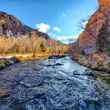


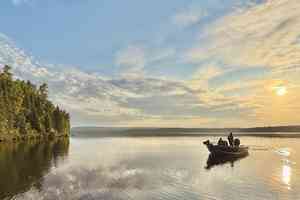


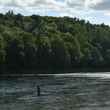
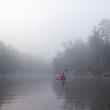



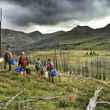





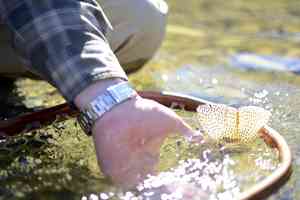
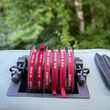


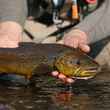

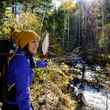

Comments